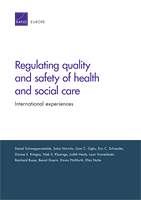Regulating quality and safety of health and social care
International experiences
Download eBook for Free
Full Document
| Format | File Size | Notes |
|---|---|---|
| PDF file | 1.5 MB | Use Adobe Acrobat Reader version 7.0 or higher for the best experience. |
Summary Only
| Format | File Size | Notes |
|---|---|---|
| PDF file | 0.2 MB | Use Adobe Acrobat Reader version 7.0 or higher for the best experience. |
This report is concerned with 'standards of quality and safety' within health and social care systems. Care standards are intended to support efforts in maintaining and improving the quality of care; they have been developed across countries, although the ways in which they are implemented and applied differs between nations. Taking a range of six countries, we review the regulatory mechanisms that have been implemented to ensure that essential standards of care are applied and are being adhered to, and consider the range of policy instruments used to encourage and ensure continuous quality improvement. We report on Australia, England, Finland, Germany, the Netherlands and the USA. The report is intended to inform policy thinking for the Department of Health and others in developing the regulation of safety and quality of health and social care in England. It was prepared as part of the project 'An "On-call" Facility for International Healthcare Comparisons' funded by the Department of Health in England through its Policy Research Programme.
Table of Contents
Chapter One
Introduction
Chapter Two
Overview of findings
Chapter Three
Australia
Chapter Four
England
Chapter Five
Finland
Chapter Six
Germany
Chapter Seven
The Netherlands
Chapter Eight
USA
Appendix A
Template for data collection
Research conducted by
The research described in this document was prepared for the UK Department of Health (England) within the PRP project 'An 'On-call' Facility for International Healthcare Comparisons'. The research was conducted by RAND Europe.
This report is part of the RAND Corporation research report series. RAND reports present research findings and objective analysis that address the challenges facing the public and private sectors. All RAND reports undergo rigorous peer review to ensure high standards for research quality and objectivity.
Permission is given to duplicate this electronic document for personal use only, as long as it is unaltered and complete. Copies may not be duplicated for commercial purposes. Unauthorized posting of RAND PDFs to a non-RAND Web site is prohibited. RAND PDFs are protected under copyright law. For information on reprint and linking permissions, please visit the RAND Permissions page.
The RAND Corporation is a nonprofit institution that helps improve policy and decisionmaking through research and analysis. RAND's publications do not necessarily reflect the opinions of its research clients and sponsors.

